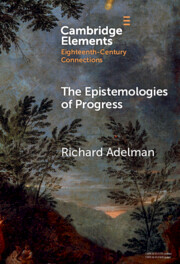Element contents
The Epistemologies of Progress
Published online by Cambridge University Press: 28 April 2025
Summary
Information
- Type
- Element
- Information
- Online ISBN: 9781009614191Publisher: Cambridge University PressPrint publication: 29 May 2025
Bibliography
Primary Sources
Secondary Sources
Accessibility standard: Unknown
Why this information is here
This section outlines the accessibility features of this content - including support for screen readers, full keyboard navigation and high-contrast display options. This may not be relevant for you.Accessibility Information
- 1
- Cited by
